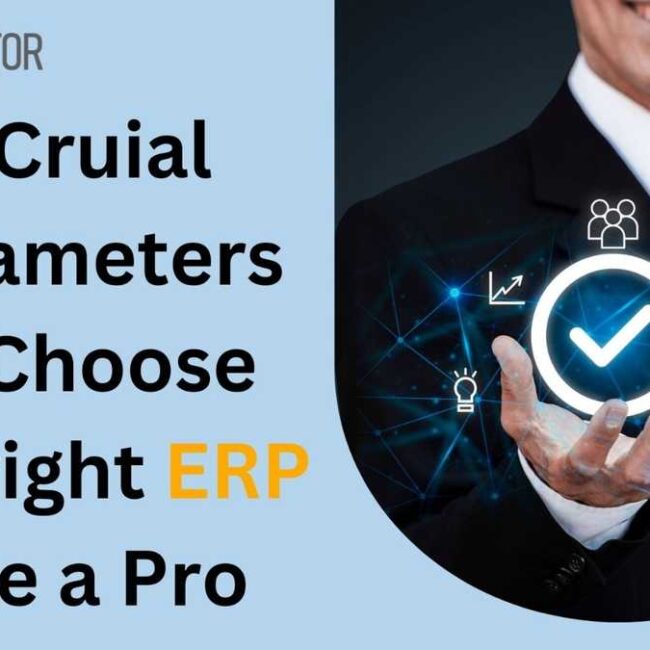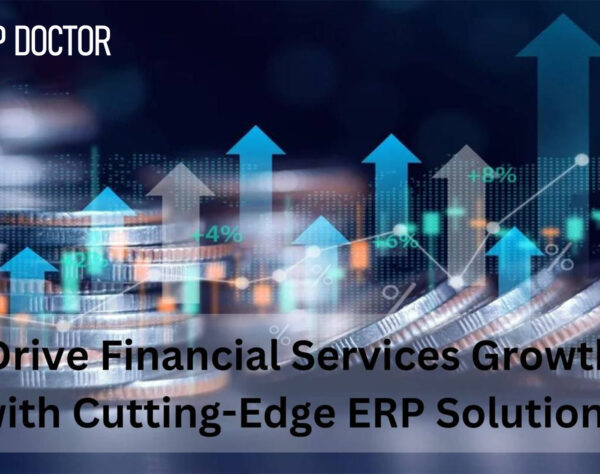
Struggling to Evaluate an ERP Software?

Investing in Your Success: A Practical Guide to Evaluating ERP Software Solutions
Are you a decision-maker in your company? Whether you’re a CEO, director, or a key stakeholder, evaluating ERP software can be a daunting task. The right ERP system can propel your business to new heights, while the wrong choice can lead to operational chaos leading to significant costs and time losses. To simplify your decision-making process, we’ve identified four critical parameters to consider: the reach of ERP, the ecosystem of ERP, the roadmap of ERP, and the financial stability of the ERP-providing company.
1. Understanding the Reach of ERP Software
The reach of an ERP system is a crucial factor in your evaluation. This refers to the system’s ability to integrate and manage various business functions such as finance, HR, supply chain, and customer relationship management. An ERP with a broad reach ensures that all departments are seamlessly connected, fostering better communication and collaboration.
Key Points to Consider while Evaluate ERP Software:
Integration Capabilities with ERP Software:
Can the ERP integrate with your existing systems and third-party applications?
Scalability with ERP Software:
Will the ERP support your company’s growth and expansion plans?
Global Operations with ERP Software:
If your business operates internationally, does the ERP support multi-currency, multi-language, and global compliance requirements?
2. The Ecosystem of ERP Software
Understanding the ERP ecosystem is crucial for leveraging the full potential of ERP systems. Key components include:
ERP Software Training Center:
A central hub providing comprehensive training programs to ensure users are skilled in all aspects of the ERP system, from basic navigation to advanced functionalities.
Expanding the User Base:
Increasing the number of proficient users through thorough onboarding, continuous education, and the establishment of internal user communities to share knowledge and best practices.
Diverse Implementation Strategies:
Customizing ERP implementation to meet business needs through phased, modular, or tailored approaches, enhancing efficiency and aligning with the organization’s workflow.
By prioritizing robust training, expanding user proficiency, and adopting flexible implementation strategies, businesses can build an effective ERP ecosystem that improves efficiency, decision-making, and competitiveness.
3. Evaluating the Roadmap of ERP
The roadmap of ERP outlines the software provider’s plans and ongoing development efforts. Understanding the ERP roadmap is crucial to ensure that the software will continue to evolve and meet your business needs over time. Consider the following:
Product Updates and Enhancements:
How frequently does the ERP provider release updates and new features?
Innovation and R&D Investment:
Is the ERP provider investing in research and development to stay ahead of technological trends and industry demands?
Customer Feedback and Influence:
Does the ERP provider consider customer feedback in their development process, and can you influence future product features?
A well-defined ERP roadmap demonstrates the provider’s commitment to continuous improvement and innovation, giving you confidence in the software’s long-term viability.
4. Assessing the Financial Stability of ERP Providing Company
The financial stability of the ERP-providing company is a critical factor in ensuring that the software will be supported and developed in the long run. Evaluate the following:
Company Financial Health:
Review the ERP provider’s financial statements and performance metrics to ensure they are financially sound.
Market Presence and Reputation:
Consider the provider’s market share, customer base, and reputation within the industry.
Longevity and Track Record:
How long has the ERP provider been in business, and what is their track record for delivering successful ERP implementations?
In Conclusion, Choosing an ERP provider with strong financial stability reduces the risk of disruptions and ensures ongoing support and development for your ERP system.
Evaluate ERP software requires a comprehensive analysis of various factors. By focusing on the reach of ERP, the ecosystem of ERP, the roadmap of ERP, and the financial stability of the ERP-providing company, you can make a well-informed decision that aligns with your business goals.
As a CEO, director, or decision maker in your company, taking the time to thoroughly evaluate these parameters will ensure that you choose an ERP system that not only meets your current needs but also supports your future growth and success. Remember, the right ERP system is a powerful tool that can streamline your operations, improve efficiency, and drive your business forward.
Are you ready to evaluate ERP software with these key parameters in mind? Share your thoughts and experiences in the comments below!
To learn more about our services, please visit us at: https://erpdoctor.in/
Embark on an inspiring journey today – Visit our website and discover a world of knowledge, creativity, and endless possibilities! Don’t miss out on exclusive content and exciting updates. Click here to explore and be part of our thriving community!







